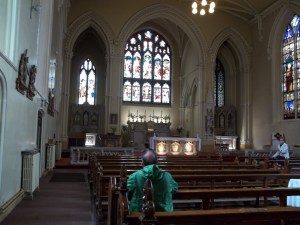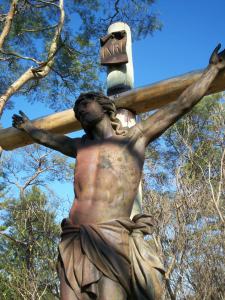Good things come in small packages.
How often have we heard that expression? Yet the truth of this little maxim is proven time and again in our history, and in our day to day dealings with each other. Often times, we find that the simple little gestures from others, rather than the grand and extravagant ones, are the ones that have a stronger influence or make a greater impression on us.
Time and again, in Sacred Scripture, we see this represented; great and wonderful things can come from the most (apparently) insignificant beginnings. The choosing of a small desert tribe –the children of Israel – to be the vehicle through which God would make Himself known to the world; the selection of David, a humble shepherd and the youngest of Jesse’s sons as the future king; the birth of our Savior in a lowly stable. It is from the most modest beginnings or circumstances that God makes His presence and His will known.
In today’s Gospel, we are presented with the image of a mustard seed; a tiny speck or grain, looking like no more than a grain of sand. But when that seed is planted and takes root and grows, it becomes a great bush or shrub – a tree really, and birds can come and make their nests in it. This is the wonderful symbol that Jesus uses for the kingdom of God; something very small and insignificant is planted, and from this humble beginning, something wonderful and great begins to spread and grow. The birds are attracted to it as a place to nest, to build a home, to live in and raise their young in it. They are not forced to land or nest in this tree – they are drawn to its shelter and they choose to dwell there; much like the human soul – drawn to live in God’s love and life; they are not forced into it – yet they dwell in it, resting and raising their own young in it.
And of course, as the mustard tree flowers and blooms it provides more seeds, that in turn fall and are scattered – sometimes by the birds themselves- and spread throughout the area, causing more trees to grow so that more birds can come and nest – and so on; all from the smallest beginning from a humble little seed.
The message of this gospel passage is particularly important, especially in our current day and culture, to remind each of us of the role each of us plays in the spreading of the Kingdom – the support of our own and other’s faith lives, being heralds of the Christ within our own circumstances.
This is not just a responsibility of ‘professional’ Catholics – priests, deacons, religious, pastoral ministers, lay leaders; every member of the Church community must play a part in presenting and preserving the faith within our own families and communities; but it is a presentation through example, a lived witness to the Gospel. We are called to support each other in this, and with the aid of a community of believers, we can all truly do great things for God.
And as if this ‘communal’ support were not enough, we are reminded by Jesus that we are also supported in all of this through the grace of God. God’s grace is here to help hold us up in times of trial, in times of sadness, and in times of joy.
Empowered by the grace of God, we are given the tremendous opportunity to be that influence for good in the world; realizing that the slightest actions in our lives will influence others. Whether or not we realize it at the time, our words and actions will be the standard through which others will view Christ and His Church.
It is something that we are all called to, to use all those small moments in our daily lives, both great and small to further the message of the Gospels; to be those mustard seeds of witness; to spread the kingdom of God in our homes, our workplaces, our schools, and our communities.
Praised be Jesus Christ, now and forever!






